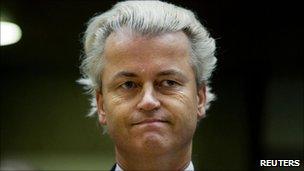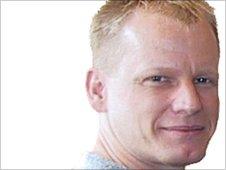Wilders acquittal: Dutch reaction
- Published

Mr Wilders said the verdict is 'a victory for freedom of expression in the Netherlands'
Dutch far-right politician Geert Wilders, who described Islam as "fascist", has been acquitted of inciting hatred against Muslims.
Judge Marcel van Oosten accepted the Freedom Party leader's statements were directed at Islam and not at Muslims.
Here, BBC News website readers in the Netherlands react to the verdict.
Daniel Milloy, Amsterdam
While I find Mr Wilders' style and rhetoric extremely repugnant, I am pleased that he was acquitted on these charges.

"A belief system must be able to withstand criticism"
Incitement to hatred and violence, and knowingly spreading lies should be illegal, but debating the validity of belief systems - religious or otherwise - is an essential element of Western democracy.
I am Christian, yet I would find it disturbing if people were not permitted to debate Christianity, or even to draw insulting political cartoons about what I consider sacred.
If they are not protected in the expression of their opinions, how long will I be protected in expressing mine?
I think that a belief system must be able to withstand criticism and debate, otherwise we might as well trade our democracy for Iran's or Nazi Germany's political systems.
M van Duijn, Leiden
I am a Dutchman who converted to Islam many years ago for two simple reasons.
The first is purely because I like the faith, while the second relates to the fact that I married a Muslim Moroccan woman.
I am blond and blue-eyed but when people find out that I am a Muslim, they sometimes treat me differently.
I am concerned about the decision of the court regarding Mr Wilders but it was not something unexpected.
People in the Netherlands do not generally like immigrants because of the fear of housing and social benefits being taken over yet they don't want to do the "dirty" jobs that these people do.
Mr Wilders' rhetoric is just a latest manifestation of this.
Islam is being used like a weapon to target foreigners. They think just because some Muslims carried out terrorist activities, that it is fine to brand everyone like that. Muslims are being made scapegoats.
Mr Wilders has links with Israel and is generally ready to defend it. He takes advantage of the already-fraught tension between Israel and Palestine and this is just another strand of this.
Muslims are the minority here and so are being picked on. However, it must be said that a big group of Muslims can do the same to others. This is what happens with majorities and minorities - there will always be tensions.
Sjaak Willems, Arnhem
I heard the court's verdict this morning and was amazed by the strict line of reasoning the judges followed.
It would have been easy for them to take the whole context into account and conclude that Wilders' aim is to blame a part of the population for everything that's wrong with this country.
It also highlights a curious mode of reasoning in Dutch law - that it is possible to insult a religion without insulting its believers.
Wilders has been careful to balance on the edge of what is legally permitted and the court has applied a High Court verdict with the utmost restraint.
So now a man with a large following and an unclear political agenda has permission to say what he likes.
It will hurt a lot of feelings, but will not have many practical consequences.
His party has the kind of political cadre you don't want to be seen in public with. There is no real party organisation, no activity on the streets.
What this does, however, is re-adjust the image of this country as a liberal and social-minded nation.
I know that was a lot of window dressing, but having all the muck from your cellar served out on your dinner table is not an experience I wished for.
More comments
While I am not a fan of Mr Wilders, I do applaud him for his courage to defend free speech here in The Netherlands. For some time free speech has been under attack here, especially when it comes to defending the traditions and values of our land. Luckily the judges in this case have come to their senses. I hope that now Mr Wilders is relieved of this burden, he can continue his fight for our values. Jack Bakker, Roosteren
The ruling is unfair to Muslim people everywhere. Nothing can be compared with the holy Koran. Mahamud Omar, Amsterdam
What has this man achieved so far with his hard views? Twenty years ago the Netherlands was one of the best countries in the world in every sense of the word. The last few years, populists like Mr Wilders have literally turned the whole country upside down with their populist politics. Maybe and hopefully common sense will eventually prevail once again before too long in the Netherlands and most of the populists like him and his colleagues will just be voted out of the Dutch Parliament. Sebastian, Maasland
A dark day for race relations and multi-culturalism in the Netherlands. Nick, Friesland
Although I personally find Mr Wilders obnoxious, I believe he has the right to his opinion. Recent revelations over the Catholic Church have prompted many comments and insults to be aimed at the Church and its leaders, but no-one is pursuing anyone through the courts for being insulting. It seems that only comments against Islam may be treated as discriminating. Gerald Harris, Breda
I cannot help feeling that this whole judicial process has been politically motivated. Wilders has not crossed the boundaries of the law - the prosecutors knew this. One small group managed to persuade a judge with more politics on his mind than the law to force a prosecution. When it comes to hatred, it is more directed at Mr Wilders who has to live under strict security - he has to have more bodyguards than some of the Royal Family, just for exercising his right to free speech and political debate. Andy Bugden, Den Haag
Wilders deserved to be cleared. Although he is a misled politician with utterly irrelevant policies, he must not be stifled. Brouts, Leiden
As a non-Muslim who works internationally, I am totally disgusted with this verdict. It indicates a clear lack of understanding of Islam as a religion, as it cannot be separated from the followers of Islam. Denigrating their holy book is the same as denigrating the followers. Mei Zegers, Amsterdam
- Published23 June 2011
- Published23 June 2011